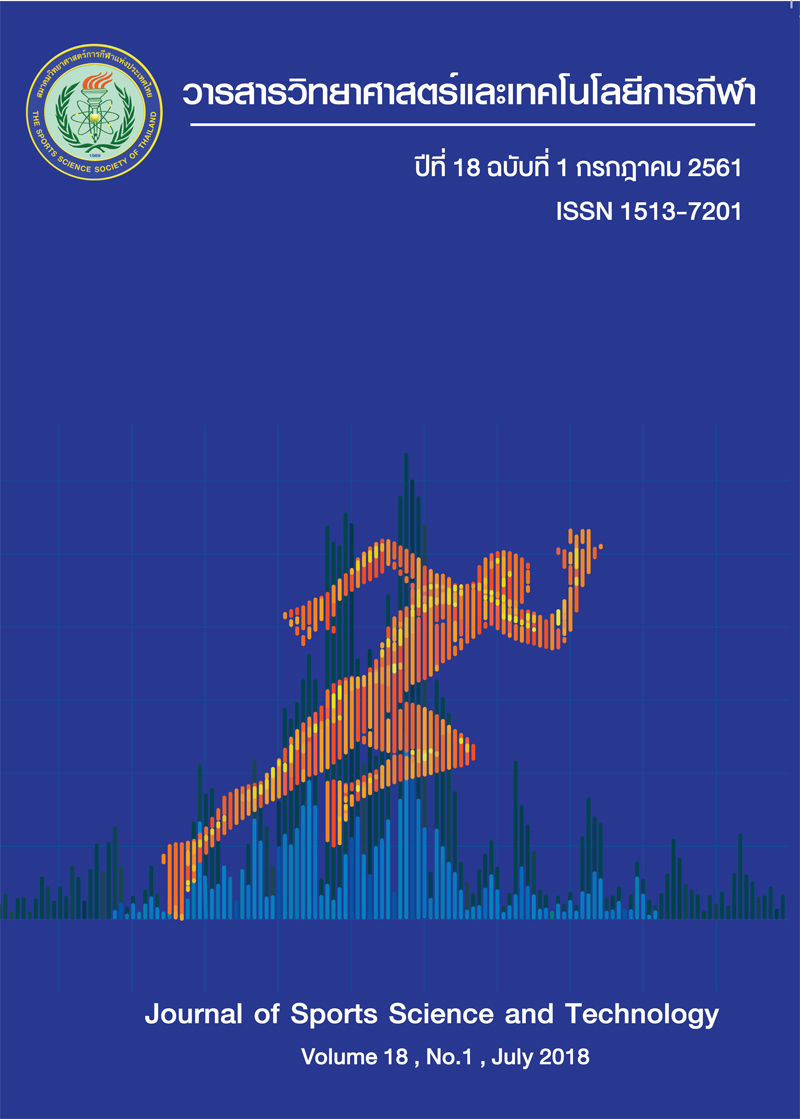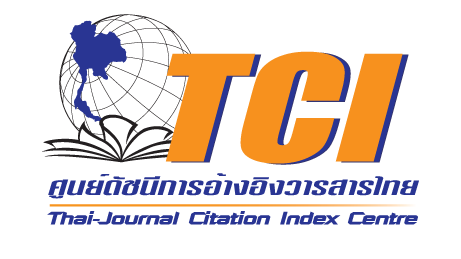A COMPARISON OF PSYCHOLOGICAL SKILLS USED BETWEEN PROFESSIONAL AND AMATEUR GOLFERS IN TRAINING AND COMPETING
Keywords:
Psychological skills / golfers / training / competitionAbstract
The purposes of the study were to investigate and compare the psychological skills between professional and amateur golfers in training and competition. The sample of 150 golfers (75 amateurs, 75 Professional) was derived by purposive random sampling with age ranging from 18 - 49 years. The instrument for this study was the test of performance strategies (Thomas, Murphy and Hardy, 1999) that consisted of 61 items. (Pokard, 2014). Data were analyzed using the mean, standard deviation, frequency, percentage, Cronbach's alpha coefficient, Wilcoxon matched pairs signed-ranks test, and Mann-Whitney U test. The level of significance was set at .05 levels. The results revealed that:
- Amateur golfers had scores of goal setting, imagery and relaxation more than a professional golfer (p < 0.05) during practice. Amateur golfers had an imagery, relaxation, and negative thinking more than professional golfers (p <0.05) in competition.
- The psychological skills used by professional golfers in competition and during practice were significant (p <0.05). The scores of psychological skills in competition more than during practice (p < 0.05) consist of goal setting and activation. The scores of psychological skills in competition less than during practice (p < 0.05) consist of automaticity, imagery, attentional control, and negative thinking (p < 0.05).
III. The psychological skills used by amateur golfers in competition and during practice were significant (p <0.05). The scores of psychological skills in competition more than during practice (p < 0.05) consist of activation. The scores of psychological skills in competition less than during practice (p < 0.05) consist of goal setting (p < 0.05).
Journal of Sports Science and Technology 2018; 18(1): 68-79
References
2. Vealey RS. Mental skills training in sport. Tenenbaum G, Eklund R, Singer R, editors. New Jersy Wiley.; 2007.
3. Daw J, Burton D. Evaluation of a comprehensive psychological skills training program for collegiate tennis players. Sport Psychol 1994;8:37-57.
4. Laundquvist. Competing under pressure: State anxiety,sport performance and assessment: tockholm University; 2006.
5. Nicholls AR, Polman RCJ, Levy AR, SH. B. Mental toughness, optimism, pessimism, and coping among athletes. Pers Individ Dif 2008;44:1182–92.
6. Theanthong A, Pan-uthai S. Factors of amateur golfer’s performance: The relationship between handicap, skill, physical, and mental components. Journal of Sports Science and Technology 2013;13(2):31-43.
7. Kemarat S, Theanthong A, Makaje N. Stress coping skills for Thai Youth futsal players: Age and achievement levels. J Faculty Phys Educ 2016;19(1):233-45.
8. Bois JE, Sarrazin PG, Southon J, Boich JCS. Psychological characteristics and their relation to performance in professional golfers. Sport Psychol 2009;23:252-70.
9. Frey M, Laguna P, Ravizza K. Collegiate athletes’ mental skill use and perceptions of success: An exploration of the practice and competition settings. J Appl Sport Psychol 2003;15:115-28.
10. Frey M, Laguna P, Ravizza K. Collegiate Athletes' Mental Skill Use and Perceptions of Success: An Exploration of the Practice and Competition Settings. J Appl Sport Psychol 2003;15(2):115-28.
11. Gould D, Dieffenbach K, Moffett A. Psychological characteristics and their a development in Olympic champions. J Appl Sport Psychol 2002;14:172-204.
12. Thanemozhi T, Margaret JGD. Comparative analysis of psychological skills between men and women volleyball players in Tamilnadu during practice and competition conditions. Indian J Appl Res 2015; 5(6):248-50.
13. Woodman T., Zourbanos N, Hardy L, Beattie S, McQuillan A. Do performance strategies moderate the relationship between personality and training behaviors? An exploratory study. J Appl Sport Psychol 2010;22:183-97.
14. Gould D, Maynard L. Psychological preparation for the Olympic Games. J Sports Sci 2009;27(13): 1393-408.
15. Dachen J. Test of performance strategies among college going athletes: Differences across type of sports and gender. International Journal of Behavioral Social and Movement Sciences 2012;1(4):139-47.
16. Thongtanunam D, Muangnapoe P, Salee S. Psychologial characteristics of Thai elite professional golfers. J Faculty Phys Educ 2017;20(2):62-72.
17. Pan-uthai S, Theanthong A. Effect of mental skills training program on mental toughness of Thai professional golfers. Journal of Sports Science and Technology 2012;12(2):117-29.
18. Katsikas C, Argeitaki P, Smirniotou A. Performance strategies of Greek track and field athletes. Biology of Exercise 2009;5(1):29-38.
19. Thomas PR, Murphy SM, Hardy L. Test of performance strategies: Development and preliminary validation of a comprehensive measure of athletes’ psychological skills. J Sports Sci 1999;17(9):697-711.
20. Kemarat S, Kemarat C. Sport psychology Bangkok: Professional Golf Association of Thailand; 2016.
21. Pokard P. Psychological performance profile of professional Thai soccer players. Chonburi, Thailand: Burapha University; 2014.
22. Thailand PGAo. GI members 2018 [Available from: https://thailandpga.or.th/
23. Panuthai C, Khaothin J, Panuthai S. The Construction of Performance Assessment Form for Amateur Golfers. Journal of Sports Science and Technology 2011;11(1):192–203. .
24. Theanthong A, Pan-uthai S. Factors of amateur golfer’s performance: The relationship between handicap, skill, physical, and mental components. Journal of Sports Science and Technology 2013;13(2):31-43.
25. Vilai Tangpanithandee. Muscle relaxation training for reduce stress 2003 [Available from:https://www. dmh.go.th/news/view.asp?id=323.
26. Arsal G. Investigating skilled and less-skilled golfers' psychological preparation strategies: The use of a think-aloud cognitive process-tracing measure: Florida State University; 2013.
27. Cohen AB, Tenenbaum G, English RW. Emotions and golf performance: An IZOF-based applied sport psychology case study. Behav Modif 2006;30: 259-80.
28. Crews DJ, Boutcher SH. An exploratory observational behavior analysis of professional golfers during competition. J Sport Behav 1986;9:51-8.
29. Jordan Schaefer, Stewart A. Vella, Allen MS, Magee CA. Competition anxiety, motivation, and mental toughness in golf. J Appl Sport Psychol 2016;28:309–20.
30. Weinberg RS, Gould D. Foundations of sport and exercise psychology. 6 ed. Illinois: Human Kinetics; 2007.
31. Thomas PR, Over R. Psychological and psychomotor skills associated with performance in golf. Sport Psychol 1994;8(1):73-86.
32. Bert Hayslip Jr., Trent A. Petrie, Mae M. MacIntire, Jones GM. The influences of skill level, anxiety, and psychological skills use on amateur golfers’ performances. J Appl Sport Psychol 2010;22:123–33.
33. Finn J. An introduction to using mental skills to enhance performance in golf: Beyond the bounds of positive and negative thinking. Annual Review of Golf Coaching 2008.







